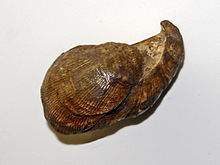Athyridida is an order of Paleozoic brachiopods included in the Rhynchonellata, which makes up part of the articulate brachiopods.[1][2]
| Athyridida Temporal range:
| |
|---|---|

| |
| Fossil specimen of Uncites gryphus from Germany, Devonian age | |
| Scientific classification | |
| Domain: | Eukaryota |
| Kingdom: | Animalia |
| Phylum: | Brachiopoda |
| Class: | Rhynchonellata |
| Order: | †Athyridida Boucot, Johnson & Staton 1964 |
| Suborders | |
The Athyridida are the Rostrospracea of R.C. Moore, 1952,[3] considered at that time to be a suborder of the Spiriferida. As with the Spiriferida, the Athyridida have outwardly directed spiral brachidia that support the lophophores on either side, but instead have non-plicate shells with rounded outlines and prominent beaks but almost no inner areas on the pedicle valve.
Athyridids began early in the Silurian, reached their greatest diversity in the following Devonian, and from then declined steadily until almost becoming extinct at the end of the Permian[3] The order rejuvenated somewhat during the Triassic, only to decline again until becoming extinct in the Early Jurassic.[4]
Athyris, Composita, and Meristella are representative genera. Three suborders have been defined.
References
edit- ^ Classification des Brachiopoda
- ^ Athyridida-Paleodb
- ^ a b Moore, Lalcker and Fischer, 1952, Invertebrate Fossils, McGraw-Hill
- ^ Vörös, Attila; Kocsis, Ádám; Pálfy, József (1 September 2016). "Demise of the last two spire-bearing brachiopod orders (Spiriferinida and Athyridida) at the Toarcian (Early Jurassic) extinction event" (PDF). Palaeogeography, Palaeoclimatology, Palaeoecology. 457: 233–241. Bibcode:2016PPP...457..233V. doi:10.1016/j.palaeo.2016.06.022. Retrieved 29 October 2022.